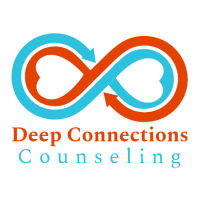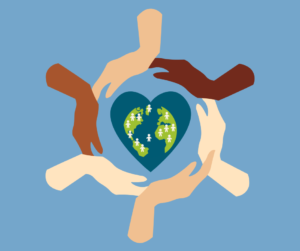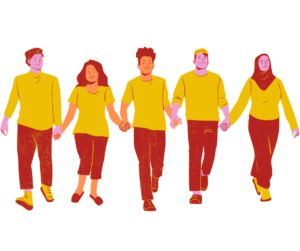Are you having trouble finding love? Are you going in and out of relationships trying to find “the one” but end up getting hurt every time? Check out 4 practices to find true love and embark on your journey to a lasting and fulfilling relationship.
What many people tend to forget is that we must fall in love with ourselves before we expect others to fall in love with us.
Without knowing your own self-value, how can you expect other people, let alone your significant other, to know your value?
Without being confident in your self-worth, how can you expect to show it to those most important to you?
You’ve definitely heard life coaches overuse the saying “if you want to be happy, you have to fall in love with yourself”. Maybe your overly positive friend is a little too showy about how her life has changed so much when they learned to love themselves, but what does that actually mean?
Falling in Love with Yourself to Find True Love
Loving yourself means accepting yourself holistically as the whole person that you are in this very moment. It means accepting all of your emotions as valid and understanding that they are an expression of the person that you have become given your past lived experiences.
Maybe you’ve had a relationship or two that didn’t pan out because the relationship felt one sided. You loved each other so much but that just didn’t seem like it was enough. You didn’t feel like you were enough. But the truth is that it is not you that is the problem.
The simple truth is that a relationship requires more than just two people loving each other. What a strong relationship requires is a mutual bond in which both individuals have
- a love for themselves
- a love for the other person
- and a love for the knowing that their partner has a strong love for themselves
THAT right there is the basis of a strong relationship.
How To Find True Love
You might find true love by being authentic, staying open-minded, practicing self-care, and understanding your needs in a relationship.
In order to truly love ourselves as ourselves, we must follow these four practices that we can do to allow us to be more conscious of the person that we are and to be proud of that person so that we may attract others who see the same value in us as we see in ourselves.
1. Self-Reflection
What is Self-Reflection?
Self-reflection describes the process of examining how your past relates to your present. In relationship psychology, it is most applicable to attachment theory, the idea that you as a social being learn how to act within relationships based on the first relationships you had, your primary caregivers, and any significant events in your life that may have affected the way you see yourself in a relationship.
Why should I Self-Reflect?
Self-reflection is crucial to understanding how you act within your relationships. In your friendships, it might be easier to identify the role that you play. Maybe you are the mom of the friend group, maybe the funny guy or the impulsive one.
However, within a romantic relationship, it is common for romantic feelings to muddy the waters of identifying how you fit into your relationship.
Taking time to understand the deep chasm that is your emotional history will offer insight into how you might be sabotaging your current relationship because of a past emotional trauma that you may subconsciously be trying to avoid.
More will be discussed in a further blog post. Stay tuned.
How do I Self-Reflect?
Let’s take a quick moment and direct our attention to our younger selves.
There were moments in our lives that undoubtedly had a significant impact on how we perceive ourselves and the relationships we attach ourselves to.
Common impactful moments include
- Unstable attachments to our parental figures
- A sudden change in the family dynamic including a death or divorce
- Moving to a new location, with a new school with new peers
- Incessant fighting within a family unit
- A bad breakup
These times in our past affect us presently. Our developmental years are a time in which we develop a sense of identity. Some of us may develop during times of insecure attachments to our parents. Some of us start to see that our relationships around us are crumbling and unstable while others see our relationships form and strengthen as complements to our identities.
Ask yourself these questions:
- “How does my past affect my present?”
- “What role did love and relationships play in my developmental years?”
- “What impactful moments may have affected the way I view my relationships?”
- “How did my intimate relationship with the people who raised me shape my intimate relationships now?”
2. Self-Awareness
What is Self-Awareness?
Self-awareness is temporarily stepping outside of your frame of consciousness and examining how you think from an outside perspective. It can be thought of as viewing your subconscious as a separate entity. Without self-awareness, we lack the objectivity that we need to examine our thoughts and emotions clearly. When we are self-aware, we are able to identify and track our thinking processes about relationships that may be toxic to our relationships now.
Why should I Practice Self-Awareness?
Self-reflection is crucial to understanding how you think and feel about relationships more generally. Are you avoidant to intimacy? Do you want to find true love because you are afraid and unsure of being by yourself? Maybe not. But no matter how secure you may feel about your relationships, there are likely thinking models buried within your subconscious that may be keeping you from loving fully.
Uncovering our emotions and relational thinking patterns helps us to identify our personal strengths and weaknesses within our relationships. With a stronger sense of self-awareness, we can form stronger relationships with others who can support us through challenges and whose attachment style complements ours.
How do I Practice Self-Awareness?
Self-reflection is all about examining and tracking your perception and expectations of intimate relationships.
Ask yourself these questions:
- “What are my perceptions about my relationships and how do I think my past lived experiences have helped to shape that?”
- “What do I believe about love and how does that shape the role I play in my intimate relationships?”
- “What do I expect from a partner in a relationship and why do I expect these things?”
3. Self-Expression
What is Self-Expression?
Self-expression is the art of identifying, validating, and expressing your emotions in a healthy and safe manner. Emotions are part of a manifestation of your lived experiences and should therefore not be avoided, but related to. Even the emotions that seem negative! Each emotion is your body and mind reacting as it has been wired.
When we hide our emotions, we hide ourselves. When we hide ourselves, we no longer attract those who would love us for who we truly are… because the world was never shown who we really were.
Why should I Practice Self-Expression?
Self-expression is allowing the world to see who you really are, shamelessly and unapologetically; as you should.
Through self-expression, you become proud of yourself, a happier person no longer chasing the unending sea of expectations and loving yourself for who you are in the present moment.
Through self-expression, you attract others who see you for who you are and are able to love your self that you also love. When both people in a relationship love themselves and each other, that is the basis of a secure and strong relationship.
How do I Practice Self-Expression?
Take some time to live in the present. Learn about living in the present here.
Identify your emotions and do as the name suggests: emote your emotions. With no judgement of negative or positive.
With only the goal of “loving myself and allowing my emotions to exist”, turn towards your emotions and allow them.
Discover what it feels like to feel those emotions. Then, let them go. As balloons into the wind, let them go naturally.
This technique allows for full cooperation and expression of your emotions without the baggage that comes with overthinking. Simply allow, feel, then release.
Allow.
Feel.
Release.
4. Self-Expansion
What is Self-Expansion?
Self-expansion is renewing your relationship with love and preparing yourself to expand your circle of influential love to people you may have never thought of enriching yourself with before. It is when you have acknowledged your past, accepted your present and expressed your present that you are then ready to expand your ability to love other people.
Why should I Practice Self-Expansion?
When we learn to love ourselves, it becomes easier to love other people and we ourselves become easier to love. When we have accepted love into our lives as our own, we take on the duty of sharing that love with others. We find other people who match our sensibilities and we form long-lasting, deep, intimate connections.
How do I Practice Self-Expansion?
When you have self-reflected, become self-aware, and are able to self-express, you will have begun on the journey of self-actualization, the complete realization of your potential, a full development of your abilities and appreciation for life.
Prepare for this journey because it is the journey of finding the meaning of your life.
While on this journey, ask yourself these questions:
- “Does doing this fit in with my values, beliefs, and perceptions?”
- “How do I know when I have derailed from my own self-guidance?”
- “How do I maintain trust and love within myself in a culture of love that may contrast with what I believe to be true?”
Learn more about how to expand your potential for love
Love is one of the most popular genres of media. Whether it be movies, music, or other parts of our culture, it is biologically, psychologically, and culturally instilled in our neurological wiring. Without love, we may feel alone. But with these practices, we will be better able to love ourselves and subsequently to find true love.
You may feel as though love may be hard to come by. You are not alone. We may be able to help. We at Deep Connections Counseling are trained in developing your ability to connect with others by first connecting with yourself. Do not give up. Call us at (757) 704-5558 or talk to us by emailing hello@deepconnectionscounseling.com to schedule an evaluation today.
We are all deserving of love.

Kinga Gudor, PhD
Kinga is a Licensed Clinical Social Worker (LCSW) with more than 15 years of experience. She specializes in couples therapy and working with individuals from a multicultural background.











